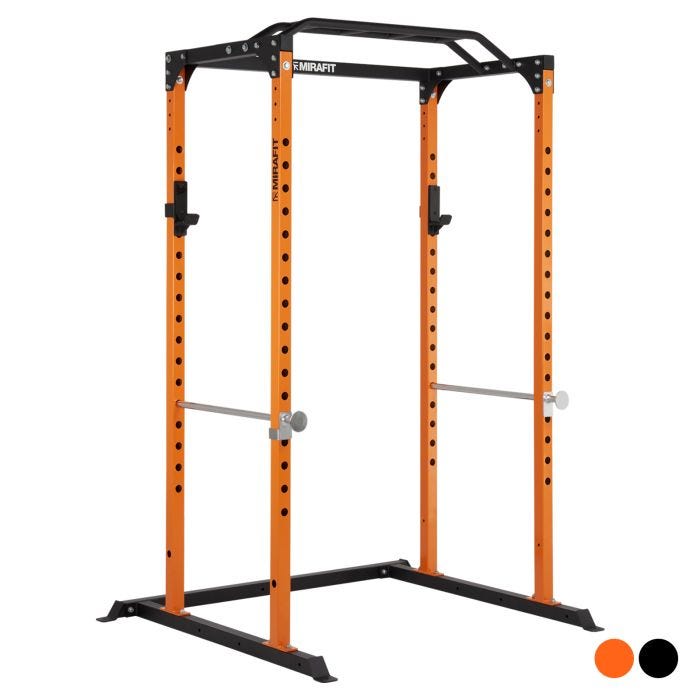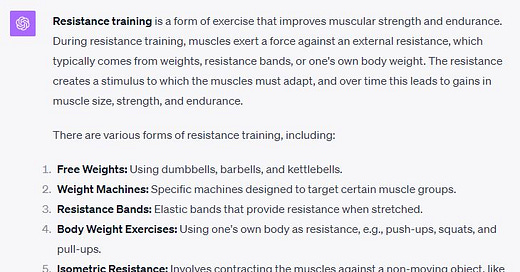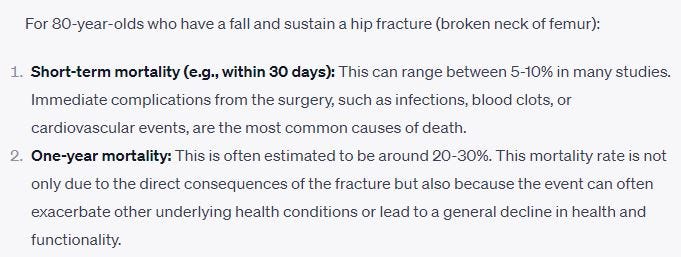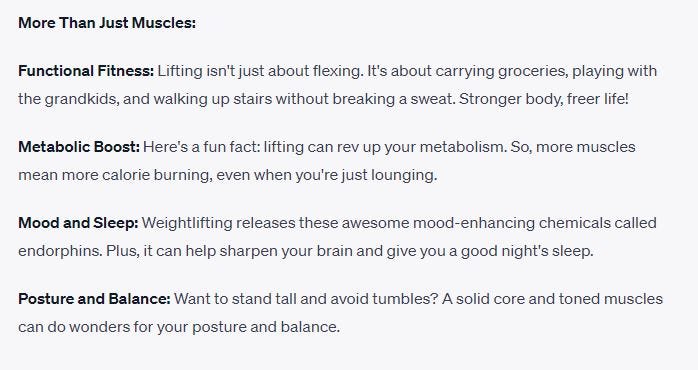Bullet point summary
After the age of 50 you lose 1-2% of your muscle mass and bone density each year
It’s worse for post-menopausal women
Weight lifting can prevent or reduce this
But if you do it wrongly you’ll damage yourself
Important note: This stuff is just my opinion and could very well be wrong. I’m not an expert. Don’t take my word for anything at all
Weightlifting - me???
It never crossed my mind till about a decade ago that I should do weightlifting. If you’d told me back then that I was going to be doing it at the age I am now (55) I’m pretty sure I’d have laughed at you. In a nice way. But I’d definitely have laughed at you.
Of course I knew lots of people who did it. Mainly through work. They were all at least 15 years younger than me, and were clearly (in my view) doing it to attract attention for mating purposes. Either that or it was a just another way for boys to try to outdo each other.
Weightlifting - yes, me, apparently
And yet here I am, at the age of 55, and I (try to) lift weights regularly. And my wife deadlifts several times a week. It makes me laugh out loud writing this. It sounds so absurd. Deadlifts? Ten years ago I had no idea what that meant. Or squat (in a weightlifting sense anyway). Or bench press for that matter. And as for reps and sets - it was another language.
I fell into it completely by accident. A friend of mine (a work colleague almost 20 years younger than me) was very into his weightlifting, and my teenage son, being a teenage boy, wanted to start. My friend wanted to sell his weights machine and my son persuaded me to buy it. My friend was completely upgrading his equipment so as well as the machine he included his bar and weights.
Now we had a weightlifting bar and weights at home, a situation I had never been in before. Actually, writing this has just reminded me that when I was about 8 years old I saw a film at the cinema called “The Strongest Man in the World”. Afterwards I remember getting the garden rake and some old tyres that for some reason my dad kept in the garden and doing my own weightlifting. I wish there was video of that somewhere.
Anyway, now we had weightlifting equipment in the house. This brought weights and the subject of weightlifting in general to the front of my mind and I can’t recall exactly but I’m pretty sure I started watching a lot of YouTube videos about how to do it safely and that sort of thing. And from there I must have come across the fact that older people should definitely be lifting heavy stuff.
And since then I’ve become something of a bore on the subject because I really enjoy telling people what they need to do (like I’m doing now). And no doubt they very much enjoy me not telling them what to do.
Why over 50s should lift heavy things (aka resistance training)
After the age of 50 people lose roughly 1-2% of their muscle mass and bone density each year. The medical terms for those are sarcopenia (loss of muscle mass) and osteoporosis (loss of bone density)
The problem is worse in post-menopausal women (although HRT can address the risk of osteoporosis to some extent).
That’s why it’s such a sad but common event for an elderly person to have a relatively minor fall, break their hip, and end up dying from some complication following it. Here’s a screenshot from ChatGPT just now:
But putting extra stress on the bones and muscles by lifting heavy things regularly can reduce the extent of both sarcopenia and osteoporosis.
Resistance Training
I don’t think it was until fairly recent years that I knew what the phrase “resistance training” meant. In case you’re as ignorant as I was (I’m sure you’re not), here’s what ChatGPT has to say (ChatGPT is just so useful!)
So yeah, it’s not restricted to just lifting heavy things, but as far as I’m aware that’s the most efficient method.
Other Benefits of Lifting Weights
Lifting weights has other benefits besides the reducing muscle and bone density loss. Here are a few that I cribbed from ChatGPT:
Don’t you just love its chatty style? No neither do I.
How to get started
I’m not remotely qualified to tell you how to do this, so I’m not going to. I’m not even going to provide links because a) you’re perfectly capable of using google yourself and b) given that I’m not qualified to tell you how to do it, I’m also not qualified to tell you who to listen to.
But having said that I’m now going to contradict myself. There’s an American guy called Mark Rippetoe that people recommended I listen to when I started a few years back. So maybe look for his videos on YouTube. Actually I have his book Starting Strength somewhere. It was rather detailed as I recall (haven’t looked at it for years and I’m not actually sure where it is) and wouldn’t particularly recommend it, but I think it’s viewed as something of a Bible in the industry.
Gym or Home?
I’ve never lifted weights at a gym, as far as I remember. But it’s probably the best place to start, especially if you can get someone to advise you on what to do. But because we have a bar and weights at home (and I also bought a thing called a power cage, which sounds dreadful but is very useful) it makes it miles more convenient than having to run or drive to a gym.

Don’t break yourself
One word of warning. If you lift heavy stuff wrongly you’re going to hurt yourself. Possibly quite badly. Weightlifters go on about “good form”, and it’s very important. I think my own form is OK, because I haven’t hurt myself for a few years now. But I hurt my right side once by trying to deadlift far too heavy a weight. And it hurt for months.
I’ve never had a personal trainer (I might at some point) so I’ve relied on YouTube videos (Rippetoe’s in particular), the Starting Strength book that I mentioned earlier, and also videoing myself and sending it to more experienced friends for feedback. And that seems to have worked.
Of course the best thing to do, which I’ve never done, is to get a personal trainer who knows what they’re on about. If you can afford that and have the time, it’s obviously the best approach.
See you next week.
Simon





